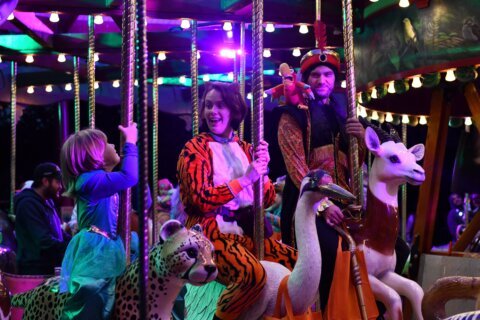“The world is tough and life is tough, and it’s fun to imagine other things.”
That’s what a University of Maryland professor said about the importance of imagination.
It’s something to remember as you let your imagination run wild this spooky season, while sharing stories around fire pits and campfires or getting into the Halloween spirit with a scary movie marathon.
“Imagination is very, very important and these stories feed our imagination and feed our need for imaginative stories,” said Mike Olmert, a professor of literature in the English department.
But some stories have a lot more meaning than just a simple jump scare.
Around the D.C. area, the Goatman is a popular urban legend to tell. West Virginia has the Mothman. New Jersey has the Jersey Devil running around the swamps. In other places, it might be vampires or werewolves.
“The Goat Man theory goes back to the Middle Ages. That story in different versions of different animals, different countries, they all have that,” Olmert said. “So these things are brought by immigrants or sailors or world travelers and things like that. It’s great. And those stories replenish, you know, the local stories in America. And then they get in Hollywood and they get made into movies and then they go around the world again.”
All of them bear some similarities — a lone road; a rainy night; it’s dark; there are few witnesses.
“It involves death, or a strange animal or a monster in the woods. You know very, very strange things. Things that are unexplainable, but you have the answer. You know this. You’ve heard this story before,” Olmert said.
Urban legends are a way to help people come up with an explanation for events or phenomena that are otherwise difficult to explain, Olmert said.
“We’re going to have to die to find out what it’s like to be dead. But these stories, we get to talk to people that are dead. They’ll come back to tell us things,” Olmert said. “Or we don’t know what it’s like to be a goat. But here’s a person who is a goat and can tell us.”
The stories feed the imagination, which Olmert said, “We like those things. And that’s why we’re still doing it.”
It’s out of folklore that literature comes, he added.
“People started writing those stories down. But someone had to make them up. Someone had to be clever enough to write them down or repeat them. And for a long time, they’re just orally transmitted over the ages and finally get into print,” he said.
And the stories will continue because, “We like stories,” said Olmert. “That’s why we buy books and read books and watch movies and watch television.”








